The Facts Are(n’t) In: Now Is the Time to Oppose Nancy Beck
Nancy Beck has failed to be forthright about her record of working to block, weaken and delay protections from toxic chemicals. Senators should oppose her nomination to Chair the U.S. Consumer Product Safety Commission, and her nomination should be withdrawn.

Beck testifying at a Senate hearing (March 2017)
The Senate Commerce Committee voted this week on four nominees to various positions in the Trump administration, including at the FCC, the Department of Commerce and the Department of Transportation. All four had a hearing in mid-June.
One nominee from that hearing who did not get a vote this week is Nancy Beck, nominated to Chair the Consumer Product Safety Commission (CPSC) and a 7-year term. Presumably, she does not have a majority of votes on the Committee. It appears that the best she can get is a tie, given that Republican Senator Shelley Moore Capito of West Virginia has publicly opposed Beck. She may have even less support than that, but nobody knows for sure. And that’s a problem.
Despite the long odds she is facing, Beck’s nomination continues to linger, neither withdrawn, as it should be, or definitively defeated by a vote, as it otherwise likely will be. So consumers still face the threat that the Trump administration’s Toxics Czar—who has done little over the past three years other than block, weaken and delay health protections from toxic chemicals including asbestos, lead, TCE, methylene chloride, chlorpyrifos and PFAS—could head up the consumer protection agency and leave them in harm’s way when it comes to toxic chemicals, tipping furniture and other unsafe and defective products. The Commerce Committee could have another vote on nominees as early as the first week of August; or could seek to advance her nomination to the floor of the Senate this fall, either before or after the November elections. That is unacceptable.
Beck’s nomination is in trouble, with good reason:
1) Her record. Over the past three years Beck has stood in the way of efforts to protect consumers from known toxic chemicals including methylene chloride in paint strippers and air pollution, lead in paint and pipes, asbestos in schools and toys, chlorpyrifos in farming communities and food, TCE in the workplace and the womb, and PFAS in drinking water and consumer products;
2) Her persistent efforts to hide her record. Beck repeatedly refused to answer the direct questions from Senators at her hearing, or in written follow-up questions. Throughout the nomination process, Beck has tried to conceal her work to promote the interests of the chemical industry at the expense of public health, suggesting that she had no decision-making role, and no effect on any outcome, yet is somehow now well-suited and experienced to run an entire federal Agency.
Her obstruction alone should be disqualifying. The Senate confirmation process is one in which every nominee is expected to be truthful and forthcoming. A simple “no comment” will not do, nor will elaborate evasions and obfuscations.
And it’s not like she hasn’t been given opportunities to speak up:
First, in Beck’s written testimony to the Committee, barely two pages long, she entirely omitted from her chronological career summary her five years serving in the role of Senior Director of Regulatory Science at the American Chemistry Council, the trade association for chemical manufacturing giants including Dow, Dupont, Exxon and Monsanto. That’s five years working on policies related to toxic chemicals, including in consumer products, down the memory hole. Beck provided no information, no substance whatsoever, regarding her work over the past 3 years, whether at EPA or while on detail first to the National Economic Council, and then the White House Office of Management and Budget. She made no mention of her role on many matters including implementation of the updated Toxic Substances Control Act (TSCA), and the administration’s PFAS Action Plan, despite extensive press coverage of these topics. If Nancy Beck has a story to tell about her work and her qualifications to run the CPSC—or an explanation for her many harmful policy decisions—she chose not to tell any of it in her written testimony, which was essentially a blank page.
Second, in Beck’s hearing testimony, she dodged and dissembled, evaded direct questions, claimed that several of her most troubling activities were secret, and generally endeavored to throw sand in the eyes of any Senator—most notably Senator Capito—who sought to pin her down on her doings and whereabouts. In opening remarks before questioning Beck, Senator Capito said specifically that she was troubled by a phone conversation they had the previous day; and was concerned about the truthfulness of some of Beck’s answers. Beck proceeded to provide further misleading answers to the Senator’s questions in person. It was an appalling display, and you could sense the chill from all the Senators present at the hearing. Those that did not question Beck simply ignored her; not one attempted to defend her record or her stonewalling.
Third, in Beck’s responses to written questions from Committee members, she failed to answer Senator’s queries or speak honestly about her record. Here are two examples:
- Senator Kyrsten Sinema of Arizona asked a very straightforward question: why didn’t Beck use her authority under TSCA to issue what is known as an “8(a) rule” to require manufacturers of PFAS to report their production of PFAS, and the resulting exposure, including to workers? Beck refused to answer the question. Beck literally offered no response regarding the reporting rule, and instead talked about other mechanisms that provide information about PFAS—the Toxics Release Inventory, and Significant New Use Rules. Beck implied that she had used those tools to increase public knowledge on PFAS, when in fact she has refused to use them as well. In November, Congress got tired of waiting for the administration to act on PFAS, and ordered EPA to issue an 8(a) rule, no later than January 2023, but Beck’s inaction has cost the public years. In addition to the 8(a) rule, Congress set deadlines for EPA to use the Toxics Release Inventory and finalize the Significant New Use Rule. Beck also failed to disclose her recent work to weaken these rules that Congress has recently ordered.
- Senator Richard Blumenthal of Connecticut asked Beck about her failure to protect workers (and consumers) from methylene chloride by refusing to finalize a proposed ban on commercial use of methylene chloride. When Congress updated TSCA in 2016, it included a provision that specifically authorized EPA to take action to reduce exposure from methylene chloride in paint strippers, based upon its recently completed risk assessment, without requiring additional evaluation under the new law. In her response to Senator Blumenthal’s question (“[W]hy have you failed to finalize the proposed ban on commercial sales and use, when EPA found a) that workers are at much greater risk of exposure and harm from methylene chloride in paint strippers and b) that consumers are still also at risk from the commercial sales and use that you have failed to take action on?”)—Beck responded that commercial use of methylene chloride in paint strippers is undergoing review by EPA under the new risk evaluation process—exactly what Congress said that EPA did not need to do. Beck made no mention of the streamlined process Congress created and why she failed to use it. Beck was misleading in her answer, and in refusing to own her role in a decision that led to several deaths. Beck also attempted to take credit for the ban on consumer uses—adopted after a two-year delay—without acknowledging the massive public pressure brought to bear on Beck and former EPA Administrator Scott Pruitt by the families of some of the people who died from methylene chloride exposure due to her inaction.
These are very clear warning signs of how Nancy Beck would act as Chair of the CPSC—making poor decisions that harm consumers and children, passing the buck, shading or outright mis-representing the truth to Congress and the public, and taking credit for work that is not her own. How can somebody with this record possibly merit confirmation by the U.S. Senate?
Some Senate offices have declined to take a position on Nancy Beck’s nomination, because it was “still in Committee,” and they were waiting to hear her testimony, or see her responses to written questions. Now that process is complete. Senators have all the information they are going to get, and Nancy Beck will not be providing additional facts. Senators now have plenty of evidence of the nominee’s hiding, hedging and dishonesty. At every turn she has avoided disclosing any detail whatsoever, while disclaiming responsibility for EPA matters that lie squarely within her job description. She has not offered a single coherent argument as to why she should be confirmed to head the CPSC.
There is no reason to wait any longer on Nancy Beck’s nomination. Senators on and off the Senate Commerce Committee should come forward and voice their opposition. Consumers should not have to wait any longer to know where their Senators stand on Nancy Beck and her record of blocking protections from dangerous chemicals and then ducking accountability for her actions. The public deserves to know now whether Nancy Beck has the votes to achieve confirmation by the Senate, and if she doesn’t, her nomination should be withdrawn.




